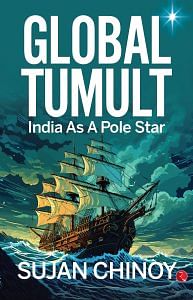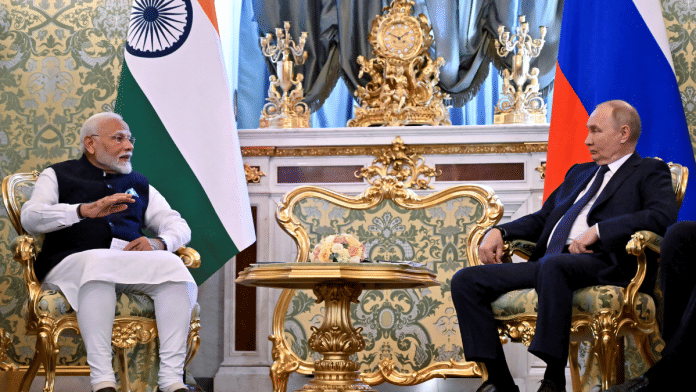Western media and leaders have repeatedly suggested that India, the world’s largest democracy, should condemn Russia’s invasion of Ukraine. However, not much has been said about how the West takes positions on international issues solely on the basis of national interests, be it about Iraq, Libya or abandoning the people of Afghanistan to the Taliban.
Today, the West’s prejudices are also starkly evident in the UNSC’s inability to put an end to the mounting suffering and casualties among the civilian population in Gaza. For long, the West has also turned a Nelson’s eye to China’s egregious actions in the Indo-Pacific, blinded by its own trade and economic interests.
The West’s sermons that India should jump on the bandwagon in taking positions on the war in Ukraine have been met with befitting ripostes by India. In the recent past, S. Jaishankar, India’s foreign minister, has frequently reminded his interlocutors of India’s own values, historical experience and strategic moorings that guide it in navigating an uncertain world.
History is replete with examples of exceptionalism practised by the West. It failed in its assessments of both China and Russia largely because it subordinated strategic challenges to economic interests. It failed to democratise these authoritarian states and mainstream them into the West’s liberal order, though not for want of opportunity or effort. The failure to do so had much to do with expedient national interests, often commercial, that trumped strategic planning. Within months of the Tiananmen crackdown on civilians in June 1989, the US had mounted secret visits of senior administration officials to Beijing to normalise ties. Europe had followed suit, with mercantile interests leading these initiatives.
Germany’s Indo-Pacific vision hinges on a China Plus One policy. It continues to maintain deep engagement with China in order to protect its huge trade and economic interests with that country, with security issues at a lower ebb. France, which regards itself as a resident Indo-Pacific power, has become the first country to join China in building seven infrastructure projects worth over $1.7 billion in Africa, South East Asia and Eastern Europe.
It is little wonder that Jaishankar had to frequently call out many of the contradictions in Western positions. Speaking at a press conference at the end of the India–US 2+2 Ministerial Dialogue in Washington in 2022, he stated that the EU probably buys more energy from Russia in one afternoon than what India buys in a month. It was an apt rejoinder to those obsessed with India’s energy imports from Russia. Less than 2 per cent of India’s energy imports at the time were of Russian provenance, whereas Germany, Italy and France accounted for the bulk of the EU’s massive off-take of Russian gas. Interestingly, at a time when the US administration warned India of ‘consequences’ of bypassing sanctions, the US Department of the Treasury had just declared a new policy to firewall US imports of Russian mineral fertilisers from possible sanctions.
Also read: Being US ally means being a ‘vassal’ & India’s shift from ‘Russian-dependent fleet’ — global media
West’s double standards
The current ‘rules-based international order’ alludes to one sanctified by the UN Charter and represented by a plethora of institutions, such as the UNSC, the UN General Assembly (UNGA) and affiliated bodies. The antediluvian UNSC, which favours the victors of the Second World War, has no foundations in twenty-first century realities.
Therefore it was inevitable that Western-style democracy and liberalism would influence the new world order that emerged from the ashes of the Second World War. However, there were blemishes. The arrogation of permanent membership of the UNSC, with permanent privileges, was anything but democratic. The US had used nuclear weapons to bomb the Japanese cities of Hiroshima and Nagasaki, bringing the Second World War to an end. It emerged as the most powerful country, with an economy and military to match its proselytising policies. The UK, France, the Union of Soviet Socialist Republics (USSR) and the Republic of China made the cut in the UNSC as members of the winning team in 1945. In the case of the Republic of China, which was subsequently replaced as a permanent member in the UNSC by the People’s Republic of China in 1971, the key factor that worked in its favour was its identity as a large and populous Asian country that was aligned with the West, besides being one of the unfortunate theatres of the Second World War. Its presence in the UNSC was a modicum of inclusiveness in an otherwise ‘whites only’ group.
The West may be entirely justified in condemning Russian ‘war crimes’ against the Ukrainian people. However, one cannot help but wonder if a similar logic ever applied to the deliberate use of nuclear weapons against densely populated civilian centres in Japan, regardless of the reasons. Then US President Harry Truman’s administration simply justified the use of the atomic bomb as the best option available to America for ending the war in the Pacific, avoiding a bloody invasion of Japan and saving hundreds of thousands of American lives. The International Military Tribunal for the Far East (also known as the Tokyo War Crimes Tribunal) and the International Military Tribunal (IMT) in Nuremberg may well have been justified in trying leaders of imperial Japan and Nazi Germany, respectively, for committing crimes against humanity. If the German aerial blitzkrieg against Londoners was inhumane, so was the controversial Allied bombing of Dresden and other German cities.
War is highly condemnable; it is a dirty business in which the end usually justifies the means. History, as has been said before, is written by the victors. In fact, most of the modern history of colonies has been written by Western historians with a distinct bias.
Also read: Modi’s Russia trip shows India is no longer afraid of US sanctions like exclusion from SWIFT
Confident India charting its own path
Today, the hypocrisy in some quarters in the West has been made worse by a sense of entitlement. It has roots in a colonial age, compounded by the privileged positions that many Western nations occupy in the global system. None of the erstwhile colonial powers have ever stood scrutiny for their rapacious depredations across Asia, Africa and Latin America, not to speak of the exploitation of island nations and communities. Even today, the UN continues to list 17 Non Self-Governing Territories (NSGTs) even though the erstwhile colonial powers have taken on the more respectable label of ‘administering power’.
For some in the West, to imagine that PM Modi’s government might wilt under pressure on policy issues is a chimera. A calculus based on the premise that India would cave in under pressure from privileged international powers reflects serious infirmities in the current rules-based international order and the UN system, the reform of which has long been thwarted by those who created it. There have been many instances of permanent members of the UNSC exhibiting double standards and exercising veto power to block uncomfortable UNSC resolutions on pressing humanitarian issues, no matter how unconscionable such action was deemed to be by the majority of people around the world. The ending of apartheid, long resisted by a few powerful nations, comes to mind.
Ironically, the corroding of the current order today is from within, as privileged powers checkmate one another. Hoist with its own petard, the UNSC can do little to maintain international peace and security.
The world today needs neither the illiberal authoritarianism of communist systems nor the West’s unilateral and self-serving interpretation of democracy, human rights and the liberal order. The international rules-based order must rest on more egalitarian principles and inclusive foundations.
Under PM Narendra Modi, a confident India has demonstrated leadership in carving out its own path and destiny in keeping with its ancient culture, its values of peace and non-violence, its democratic credentials and, above all, its national interests. In refusing to join any Western posse against Russia, the Modi government has wisely avoided committing an unctuous folly.
 This excerpt from Sujan Chinoy’s ‘Global Tumult: India As A Pole Star’, has been published with permission from Rupa Publications.
This excerpt from Sujan Chinoy’s ‘Global Tumult: India As A Pole Star’, has been published with permission from Rupa Publications.






